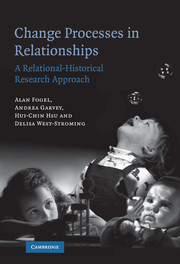Book contents
- Frontmatter
- Contents
- List of figures
- List of tables
- Acknowledgments
- Prologue Overview of the research problem and summary of findings
- 1 Relationships as developing systems: theoretical foundations
- 2 Mother-infant relationship development in the first six months: from face-to-face play to object play
- 3 Relational-historical research on developmental change
- 4 Relational-historical research: the multiple case study approach, frame analysis, qualitative and quantitative analysis
- 5 Research propositions about relationship change processes
- 6 Research methods for the current investigation: subjects, procedures, and data analysis
- 7 Results of the current investigation: quantitative analysis of developmental changes in relationship frames and in infant actions
- 8 Results of the current investigation: qualitative analysis of Richard and his mother
- 9 Results of the current investigation: qualitative analysis of Betsy and her mother
- 10 Results of the current investigation: qualitative analysis of Lewis and his mother
- 11 Results of the current investigation: qualitative analysis of Susan and her mother
- 12 Summary of findings on relational-historical change
- Epilogue Laws of change: implications for theory and practice
- References
- Author index
- Subject index
5 - Research propositions about relationship change processes
Published online by Cambridge University Press: 22 September 2009
- Frontmatter
- Contents
- List of figures
- List of tables
- Acknowledgments
- Prologue Overview of the research problem and summary of findings
- 1 Relationships as developing systems: theoretical foundations
- 2 Mother-infant relationship development in the first six months: from face-to-face play to object play
- 3 Relational-historical research on developmental change
- 4 Relational-historical research: the multiple case study approach, frame analysis, qualitative and quantitative analysis
- 5 Research propositions about relationship change processes
- 6 Research methods for the current investigation: subjects, procedures, and data analysis
- 7 Results of the current investigation: quantitative analysis of developmental changes in relationship frames and in infant actions
- 8 Results of the current investigation: qualitative analysis of Richard and his mother
- 9 Results of the current investigation: qualitative analysis of Betsy and her mother
- 10 Results of the current investigation: qualitative analysis of Lewis and his mother
- 11 Results of the current investigation: qualitative analysis of Susan and her mother
- 12 Summary of findings on relational-historical change
- Epilogue Laws of change: implications for theory and practice
- References
- Author index
- Subject index
Summary
In this study, our goal is to provide a detailed description of the relational-historical process of development within the thirteen mother-infant dyads who participated in our multiple case study design. This is documentary science, similar to descriptive embryology, genome mapping, or astronomy.
This chapter is a transition, from the abstract to the concrete. This is especially daunting because the topics of research – frames and their changes – cannot be measured easily. How can change be captured? Its nature is to escape into another form, to be different on each reviewing of the data. As qualitative researchers who have spent a great deal of time with our data, we are convinced that patterns – perhaps even laws – can be perceived in frames and their change even though they cannot be defined precisely. In the remainder of this work, our task is to convey in words and pictures the patterns we have detected in our data. As scientists an additional task is to provide sufficient detail so that others with similar training and experience could attempt to replicate these observations, but let's be clear: the patterns implicate us as well as the videotapes, in our conspiracy of long-term involvement with them.
What follows is a report on the history of our relationship with a unique set of documentary videorecordings and the people in them. They show a tiny segment – a few short months – in the life history of a small group of babies playing with their mothers.
Information
- Type
- Chapter
- Information
- Change Processes in RelationshipsA Relational-Historical Research Approach, pp. 86 - 94Publisher: Cambridge University PressPrint publication year: 2006
